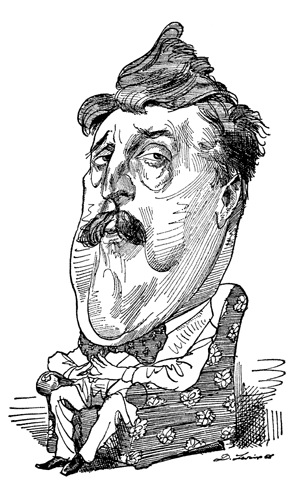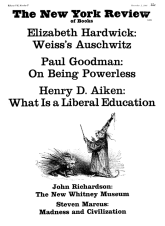Arnold Bennett is in limbo. In a time when many writers are famous mainly for being famous, he is ignored for being ignored. What ineffectuality could be worse than that of a novelist who is so merely known about? Bennett hasn’t even the piquancy which attaches to the totally unknown, the literary equivalent of that tiny restaurant as yet unspoiled. We are all (rightly) willing to be gallant on behalf of a novelist like Christina Stead whose new fame suddenly surfaces from nowhere. But in the case of Bennett (1867-1931), we know what we know: that he had a drooping eyelid, wrote very long and altogether unexperimental novels about the Potteries, was something of an Edwardian vulgarian (a “card?”), and made a great deal of money. His obsession with fact, his knowing worldliness—wasn’t he merely the C. P. Snow of his day, and where are the Snows of yesteryear? With the notable exception of John Wain (a first-rate essay), none of the critics who count, who really influence the taste of new generations, has argued for Bennett—one had almost said has interceded for him.
A reading of The Old Wives’ Tale (1908) and Clayhanger (1910) might perhaps be enough to instate Bennett. But what will persuade our friends (as distinct, say, from our aunts and uncles) to read him? No use toying with the opening pages—Bennett, like most of his Victorian masters, needs space and takes his time. Partly because space and time are so much of his subject matter. Partly because the undeflected, unpausing cumulative force which he creates in his best novels is the counterpart of his central understanding of life, its own cumulative force. Life, the mere passing of time with its strange hazards, does torture Bennett’s men and women, but it does so not with the rack and thumbscrew of a more lurid imagination, but with peine forte et dure, the slow increasing of the weights upon the suffering prisoner. Such was the traditional torture for those who refused to speak, and in Bennett’s world the highest honors are paid to those who preserve such a stoical quietude in the face of the commonplace miseries: illness, ageing, bereavement, disloyalty. The sisters in The Old Wives’ Tale, Constance and Sophia, lead different lives, from different centers of self, and yet what they have in common is a private dignity, a sense that a true reserve is cognate with true reserves, whether of energy, will, or principle.
OLD-FASHIONED MORALIZING? In this Bennett stands apart from the modern novel, but it is not clear that the eccentricity is altogether his. His novels make you wonder whether there is everything to be said (everything, not something) for the present view, which equates the morally intelligent in a writer with the morally exploratory. Bennett is as little concerned with moral exploration as a writer can decently be; he believes, as do his characters (and as most people still do, despite all the publicized moral revolutions), that most of the time we perfectly well know the difference between right and wrong, and simply find it difficult to do what is right. For Bennett’s characters, being good is difficult. In most modern novels, it is a problem. Ought Henry James’s Isabel Archer to return to her husband? A problem. Can Bennett’s Sophia bring herself to return to Bursley? A difficulty. Certainly Bennett’s temperamental lack of interest in the problematic, in the frontiers of morality, leaves his novels less than all-inclusive. But why do only the frontiers matter? James’s moral mystery-making can make us justifiably impatient; William Empson has ventured the opinion that James “only jabbers away like that in order to make the reader as confused about the rights and wrongs of the case as he is himself.”
There is something deeply heartening about Bennett’s moral world, with its high praise of “sagacity” (which is not that ubiquitous world-despising saintly wisdom), its insistence on how much will-power can do, its self-respect. Bennett never conceals the corruptions to which those virtues are liable: self-righteousness, superstition, tyranny. But Mrs. Baines happened to be right when she cried out to her daughter Sophia: “Let me warn you that young Scales is a thoroughly bad lot.” “God is not mocked”—there is a difference between thinking that such a claim is usually too simply and vindictively made, and thinking that life justifies no such claim. Too much “respectability”? But anyone who is inclined to dismiss as only pernicious such yearnings for respectability as Sophia has in the Paris of the Siege ought to consider Steven Marcus’s recent estimate of Victorian respectability in The Other Victorians. It did at least help to hold off the gravest degradations; it preserved a sense of identity.
True, there is something exasperating about the impregnability of Bennett’s world. The contrast with a slighter, more dapper, kind of fiction might be made through Constance’s sexagenarian scorn for the new cheap overcoats: “How could an overcoat at twelve and sixpence be ‘good.’ She remembered the overcoats made and sold in the shop in the time of her father and her husband, overcoats of which the inconvenience was that they would not wear out!” A kind of inconvenience, yes—Bennett’s novels, and their moral stuff, won’t wear out. For one thing, because he is perhaps the best twentieth-century novelist who has known and described industrialism without fiercely and totally condemning it.’
Advertisement
IT MAY BE that we would have to go back to Scott to find another novelist as capable of describing both the old order and the new with such impartial compassion. Bennett is indifferent neither to the sufferings caused nor those alleviated by industrialism, and he is not swept up into morbid hatred of the machine. He can entitle a chapter “Machinery” and describe the printing-presses with a loving detail which is not sentimental or vainglorious since it shows how much that machinery meant to the daily working lives. He can describe the process of “claywedging,” and then comment with a pleasure which is not smug: “At a later period it was discovered that hydraulic machinery could perform this operation more easily and more effectually than the brawny arms of a man of seven.” He can wonder at the hot-water system in a new house, and tell how much pleasure it gave—justified and not ignoble pleasure.
Admittedly, some of the machinehaters have been greater writers than Bennett (D. H. Lawrence, for one); admittedly, some of that hatred is justified. But since there are machines to be grateful for, and since Bennett’s gratitude springs from knowledge, not ignorance, we ought to be glad that the novels don’t wear out. But they are about wearing-out, with their frightening and moving accounts of old age. Mr. Shushions in Clayhanger, and Darius soon to die after struggling for breath: “The struggle was finished, and he had emerged from it with the right to breath.” Or the great scene when Sophia stands before the body of the husband whom she has not seen for thirty-six years: “What affected her was that he had once been young, and that he had grown old, and was now dead.” Bennett is consummate at that hardest and most mysterious of achievements: suggesting the passing of time. Just as some actors can age from one act to another with piercing conviction, so Bennett impresses upon us the passing of years and of decades. There is no yelp at this passing—the tone is rather that of Philip Larkin’s fine poem about the youngish mothers:
Their beauty has thickened.
Something is pushing them
To the side of their own lives.
Anybody to whom those lines are meaningful ought to find the meaning commandingly embodied, altogether authentic, in Bennett’s best novels. The last Book of The Old Wives’ Tale earns its title: “What Life Is.”
What Bennett Was?—Writer by Trade is not very likely to gain new readers for Bennett. It is a sensible middle-brow portrait, making some use of unpublished letters, and with very good photos. But it offers no reassurances, and—what is worse—no arguments, to meet those whose precise fear it is that Bennett was a “writer by trade.” Trade serves only its day. Bennett proudly inscribed a presentation-copy “Arnold Bennett, Professional Author,” but there is professionalism and professionalism; in Mr. Barker’s telling, Bennett never rises above the fluent journalist which was one of his selves. Mr. Barker himself too much resembles the popular image of Bennett—Bennett wrote Journalism for Women, Mr. Barker has written The Young Man’s Guide to Journalism. The trouble is that Bennett’s life was almost all in being a writer, and as a critic Mr. Barker offers little more than paraphrase and cheer-leading. He speaks with proper contempt of the “marketable footle” which Bennett admitted to producing all his life, but so conventional is the contrasting praise of the real novels that no one would divine from it their distinction and authority. Where Mr. Barker does succeed is in Bennett’s early journalistic career (editor of Woman), in the grim story of his marriage and separation, and in evoking Bennett as a public figure (the visit to America, the friendship with Beaverbrook). But too much of it is Mr. Prohack-work.
This Issue
November 3, 1966




